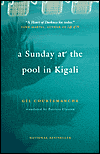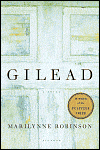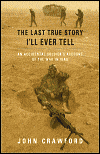OK, so I took a little time off to have a baby and do the library gala. And, as a result, I have really neglected this poor blog. But I'm attempting to get back to reality now and catch up with all those things, so ....
For record-keeping sake, here is a run-down of what the Ecelctic Book Club reviewed during my hiatus:
June - Sunday at a Pool in Kigali
Notes by Cathie: "We had a small but lively group. (Kevin, Will, Sean, Val and me) Two new people showed up - I forgot to get their email addresses but I'm pretty sure they'll come back. AC (new in town) and Mary. Mary had actually read the book. Reviews on the books were mixed. Everyone said this was the best discussion in a long time. Here are the ratings:
Kevin: 4.25 (this was Kevin's book)
Will: 3.5
Val: 3.0
Cathie: 2.5
Sean: 2.0
Mary: 3.0
Alycia: 1.5 (Sean was acting has her surrogate LOL)
Average - 2.8
July - Gilead by Marilynne Robinson

As his life winds down, Rev. John Ames relates the story of his own father and grandfather, both preachers but one a pacifist and one a gun-toting abolitionist.
No rating info available, although no one seemed to like it much.
August - Title planning meeting & more Gilead discussion
September - The Last True Story I'll Ever Tell by John Crawford

Kevin - 3.5
Sean - 3
Cathie - 3
Alycia - 3.5
Steph 3
Average - 3.25
Interview with John Crawford:
Shocked and awed
John Crawford was called up unexpectedly to serve in Iraq, where he patrolled Baghdad and discovered he had war stories to tell. Then, after a chance meeting, the battlefield soldier became a best-selling author.
Floridian Times
By COLETTE BANCROFT, Times Staff Writer
Published August 25, 2005
--------------------------------------------------------------------------------
TALLAHASSEE - Amid the lunchtime bustle of a restaurant near the Florida State University campus, John Crawford doesn't stand out.
He wears a white polo shirt, a string of small wooden beads inside its collar. His short, dark hair is damp with the August humidity.
Wiry and of medium height, he looks younger than 27. Chowing down on a Cuban sandwich, black beans and drinking a Red Stripe, he fits right in with the other college kids jamming the place.
And he is one of them, about to finish the last semester of his bachelor's degree in anthropology by writing a research paper on the evolution of the trickster figure in folklore.
But he is also a bestselling author in the middle of a media storm. "One day I was watching The Daily Show, the next day I was on it," he says. He's doing his fourth interview of the day, with three more to go.
Crawford is a veteran of more than a year of fighting in Iraq, patrolling the streets of Baghdad as an infantryman and living to write about it.
The Last True Story I'll Ever Tell: An Accidental Soldier's Account of the War in Iraq is a harrowing, tautly written and ruthlessly unsentimental story of the experience that profoundly changed his life. And now the book is changing it, too.
* * *
We had so far spent months in the desert and gotten just south of Baghdad before redeploying. The sudden introduction of a city was mind-blowing. The labyrinth of alleys and streets that would later become commonplace now seemed unfathomable. . . . It was the smell that was the worst. Rotting flesh and feces permeated the air, creating a stench that was unbearable.
- The Last True Story I'll Ever Tell (Riverhead, $23.95)
"I grew up playing GI Joe in the woods," Crawford says of his childhood in Palatka.
His father retired as a lieutenant colonel after 31 years in the Army, including service in Vietnam. His grandfather was a Marine. His great-grandfather was a Union soldier in the Civil War.
"My dad's into genealogy, and he's gone all the way back to King Philip's War or something, back in the 16th century, and everyone in the family was military," Crawford says.
Growing up steeped in that tradition, he understood the demands and dangers of military service as well as its rewards.
Crawford joined the Army right out of high school, serving three years with the 101st Airborne. He spent most of that peacetime hitch in Kentucky. "When I was at Fort Campbell, whenever we drove past Lookout Mountain, I'd say, "Hey, guys, that's where my great-grandfather got shot.' "
His service done, Crawford enrolled at FSU. In his book's preface he writes, "I enlisted in the Florida National Guard, what I thought was a joke of an organization willing to pay for the entire cost of my education in return for one weekend a month, two weeks a year."
Three years after he started college, Crawford was two credits from graduation and newly married. On the honeymoon cruise, he went to the ship's computer room to see if his grades from the last semester had been posted.
He found an e-mail from his father. His Guard unit was was being deployed. By February 2003, they were in Kuwait; they entered Iraq the day the invasion began.
* * *
People pick the Army - they become mechanics, water-supply specialists, cooks, clerks - but the infantry is different. The infantry picks the man: men who do poorly in math, excel at athletics, drink a lot, love their mothers, fear their fathers, men who have something to prove or fear they have already proven it all. We were both proud and ashamed of what we were. The stepchildren of the army, infantrymen are like guard dogs at a rich man's house. When people come to visit, the media, the USO, they lock us in the garage and tell us not to bark, but when night falls and there is a noise outside, everyone is glad we're there.
Crawford's book takes no stance on President Bush's decision to go to war in Iraq. "I wanted to avoid politicizing it. I know that as soon as you mention politics you alienate half the readers. This is about our experience as people over there, what it's really like."
Interviewers have asked him if he questioned whether he should go to war when he was called. "That's not how it works. I had contracted with the military when I joined the Guard, and they called me, so I went.
"I thought the war should have been a last resort. But nobody asked me what I thought. When you're a soldier, you don't question the administration; you're there to do a job."
But The Last True Story boils with anger at how his National Guard unit was treated by the military command structure. Equipped with unarmored vehicles, ragged uniforms, Vietnam-era weapons and body armor, their food and water severely rationed, their quarters squalid, they are "passed around the armed forces like a virus," attached to five different units.
Told their deployment would last three to six months, they remained in Iraq for more than a year. By the time they left, they had been there longer than any other unit.
That year, as Crawford describes it, alternated between brain-numbing boredom and skin-crawling terror. The book is filled with gut-churning images and brutal black humor, the soldier's time-honored method for coping.
In one story, Crawford makes a phone call to his wife, who has had a rough day taking care of a sick dog. So he tells her about his day.
"What could be grosser than cleaning up a house full of dog s---?" The disgust in her voice was palpable.
"Try cleaning up brains." I tried to catch the words and pull them back even as they leave my mouth. It's hard living with a bunch of soldiers and then trying to talk like a normal person to your wife on the phone.
* * *
Crawford, a voracious reader since boyhood, had taken writing classes at FSU, but when he borrowed a buddy's laptop one day in Iraq, he wasn't thinking about writing a book.
"I was bored. I had run out of stuff to read. So I wrote a short story."
As he finished it, a reporter for the Nation who was embedded with the unit for the day asked what he was doing. Christian Parenti read the story, asked if he could take a copy, got Crawford's e-mail address.
"I had a contract two weeks later" from a publisher, Crawford says. "It all evolved from that. That first story set the arc of the book.
"It sort of created itself."
Creation, however, did not come easily. He wrote some stories in Iraq, others after he came home.
The chapters of The Last True Story are loosely linked but stand alone as soldier's tales. "I saw these as short stories, as war stories that soldiers tell each other, part of that oral tradition."
They are based on real people ("Four of the names are changed, at the lawyers' suggestion") and real experiences, but Crawford doesn't present them as journalism. "All the events in the book are truthful," he says, but he sometimes combined details to make a story more effective.
Completing the book was one thing that helped him cope with the difficulty of coming home.
"When you went to war, in your mind the world stopped, but the world went on without you," he says.
Although his unit received a warm welcome in Tallahassee when it came back, Crawford felt he was on his own. At FSU, he had to reapply. "You're counted as a dropout."
His marriage was on the rocks; he and his wife separated. He was drinking heavily. In five months, he moved five times and once was nearly evicted.
"The hardest thing is learning to take things seriously again. After you've spent a year being shot at every day, where it's all literally life and death, it's hard to take, say, your credit-card bill seriously."
He also grappled with the attitudes of people who had not gone to war.
"Everybody has these yellow ribbons on their cars, like just saying you support the troops is enough.
"I would hear people saying, "We won the war, mission accomplished, we kicked their ass.' And they haven't left their sofas."
* * *
What I'm about to write is true. Utterly true. The first thing I wrote for this book was a fiction short story I wrote while still in Iraq. It was all about returning home and finding myself in a world where no one understood my experience, but they were all there to support me. . . . It wasn't until I got back that truth engulfed me like a storm cloud.
Since The Last True Story was published this month, Crawford's life has taken another unexpected turn.
"I still live in the same place. I haven't gotten any royalty checks yet," he says. But he has been interviewed by dozens of newspapers and radio and television shows.
In Tallahassee, the book sold out the day it hit shelves. It debuted at No. 21 on the New York Times bestseller list, and the paper published a piece he wrote about coming home on its Sunday opinion page.
An agency in Hollywood is looking at the book, Crawford says.
"Actually, over there we used to always joke about who's going to play us in the movie. My beard grows out really fast, so we'd always say Tom Hanks would play me, you know, he had that scruffy beard (in Saving Private Ryan)."
Crawford laughs. "Anybody other than Tom Cruise, I guess."
Some interview questions have surprised him. "I had this really hostile interview with a radio station in Miami. The guy kept saying, "You're slandering the soldiers, writing these things.'
"We really idealize soldiers, but soldiers are a part of their society. I'm very pro-soldier, but people need to realize they're human beings. I was a soldier. I know."
Most of the response from readers, he says, has been positive. The only negative feedback he has received is from people who are on the extremes of prowar and antiwar opinion. "They want more. They want me to be on their side."
He has heard from many of the men he writes about in the book. "They say sometimes it's hard to read it, because it brings back a lot of memories. But they've all been very positive."
And he has heard from another crucial critic: "My dad liked it, and that was important to me, because he's a veteran from a different generation."
Crawford and his wife are back together. He is thinking about going to graduate school to earn a degree in creative writing, "maybe do a little teaching."
And he is finishing that degree in anthropology, the social science that is pretty much the birthplace of cultural relativism. The Last True Story speaks bluntly about the rage American soldiers feel toward the Iraqi people in a situation where they never know who might be their enemy.
Throughout the book, Crawford and his buddies call Iraqis "hajjis," a slur equivalent to World War II's "Jap" or "Kraut."
"Americans always come up with a word for the people we're fighting. Before I left, my dad said to me, "Remember, you can't trust Charlie.' " Back on the green and peaceful FSU campus, Crawford says, "I know I shouldn't have that ethnocentric attitude. But you can only spend so much time trying to kill each other before you feel that way."



